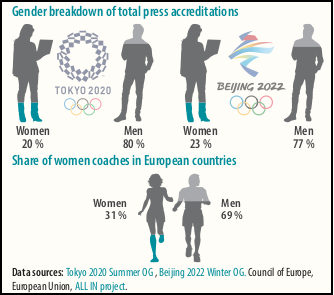Brussels – Women and sports, an impossible combination. The presence of women on the field and in decision-making environments is still all to be found and promoted. The gender gap in this area is still far too pronounced, in Europe as elsewhere. The European Parliamentary Research Service, on the occasion of International Women’s Day, produces a rather telling overview of a system that is still the preserve of men. In a nutshell, even today, “sport is one of the social institutions in modern society with the greatest gender inequality,” denounces the document.
There is underrepresentation of women at the organizational and management levels. “Today, despite a clear trend towards increased female presence, there is still ample room for improvement when it comes to women’s participation in sports governance structures ” at the international as well as the national level. Looking at the IOC, “The International Olympic Committee currently numbers just one third female members and honorary members, namely 47 out of a total of 147.” At the European Union level in 2023, “only 4 of the 27 presidents of national Olympic committees were women.” It does not end there. Also in 2023, European Parliament experts note, only 22 per cento of all top decision-making positions in the national EU federations of the 10 most popular sports were held by women.”
Then there is the issue of involvement in sport. Sports disciplines have seen growth in the women’s movement, but the increase in female athletes is not matched by an increase in female coaches. “Although the number of women actively involved in sport has increased dramatically over the past 50 years, female coaches across the globe are a statistical minority in nearly all sports, at all performance levels”. Just as an example, in Europe women accounted for only 31 per cent of all sports coaches in 2019.
 Wages are another issue. In sports, there is a replication of what is happening in the world of work: for the same job, a woman earns less than a man. Specifically, “Football, golf and basketball remain the sports with the biggest financial gaps in awards,” as well as payroll. Truth is, the paper points out, that ” the gap between men and women footballers’ salaries remains enormous, and football is not unique. In 2023, there was not one woman among the 100 best-paid athletes in the world.”
Wages are another issue. In sports, there is a replication of what is happening in the world of work: for the same job, a woman earns less than a man. Specifically, “Football, golf and basketball remain the sports with the biggest financial gaps in awards,” as well as payroll. Truth is, the paper points out, that ” the gap between men and women footballers’ salaries remains enormous, and football is not unique. In 2023, there was not one woman among the 100 best-paid athletes in the world.”
Study and situation do not elude Stefania Zambelli (FI/EPP), who calls on the European Commission to change course with a parliamentary question, which she announces on International Women’s Day. Here, she denounces the “situation of discrimination and strong inequality,” as evidenced, she criticizes, by “media that do not give due prominence to women’s sporting events,” and a world where, in Italy, “Serie A female footballers earn on average 34 times less than male footballers.” She asks the EU executive to “work at all levels to ensure full equality in the world of sports as well.” This is not a casual clarification, as the EU Parliament’s Center for Studies and Research highlights how the latest available data (2011) shows that “sports journalism in the print media was a male world.”
Zambelli’s initiative serves to put pressure on the states. With the Lisbon Treaty the European Union has acquired a specific competence in the field of sports. Article 6(e) of the Treaty on the Functioning of the European Union (TFEU) gives the Union the competence to support or supplement the action of Member States in the field of sports.
English version by the Translation Service of Withub

